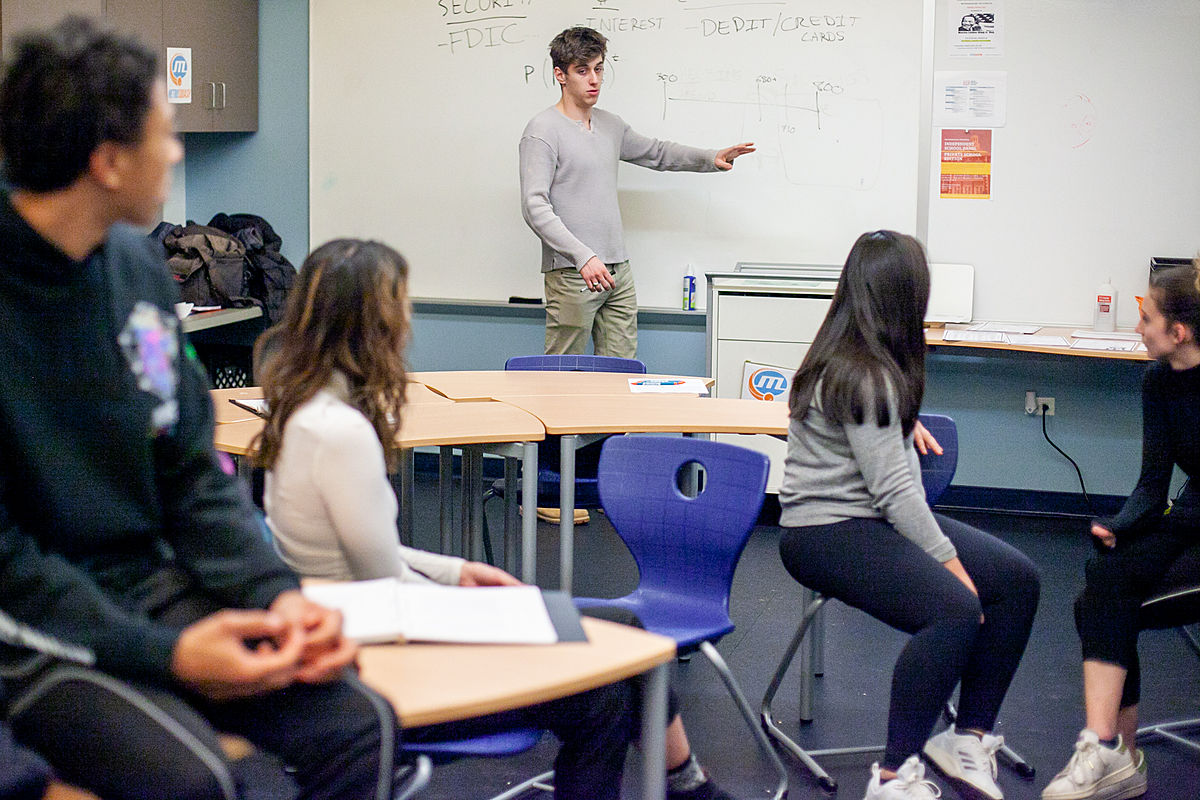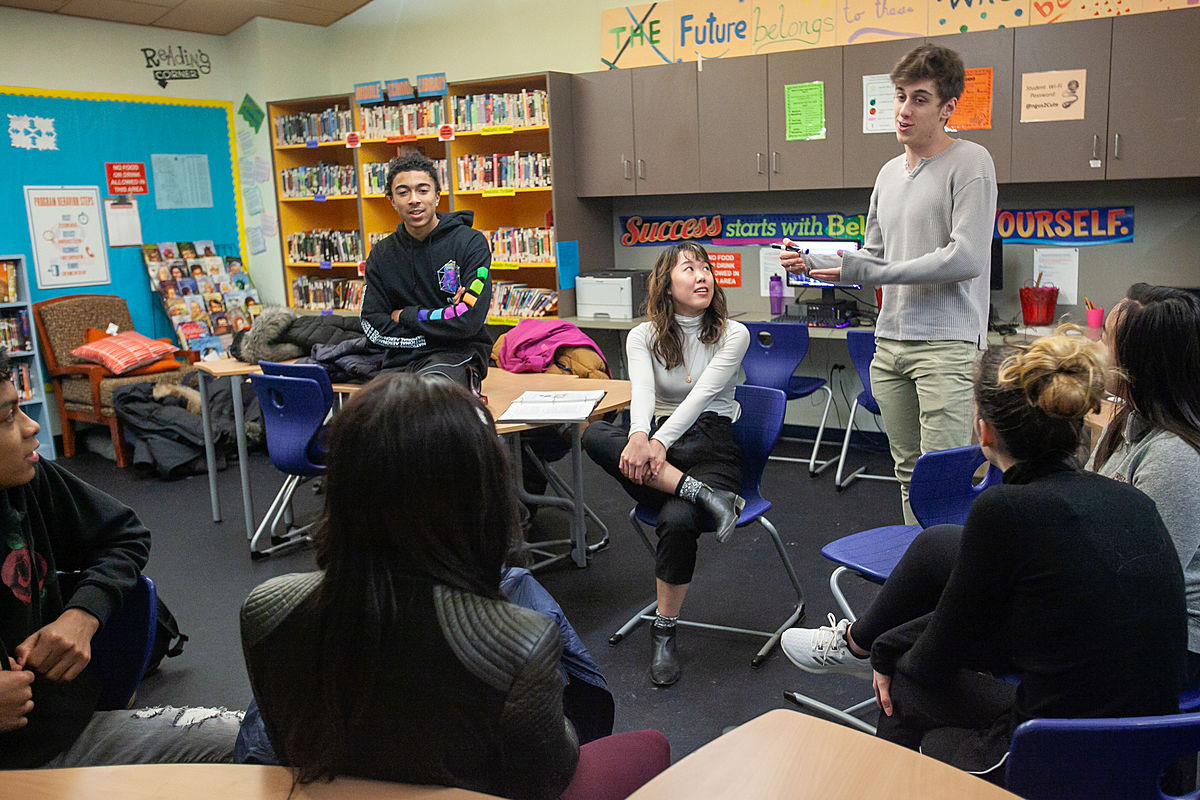In the wake of the 2008 financial crisis, five UChicago first-years had the idea of forming a group to teach financial literacy to underrepresented high school students. Today, Moneythink is not only a thriving UChicago recognized student organization (RSO) with sixty volunteer mentors working with high schoolers at nine sites, it’s also a national nonprofit that operates at thirty-one colleges and universities. In 2013, President Obama honored Moneythink as one of the most promising social innovations for the future of the United States.
RSOs are one of the many ways that the learning experience at UChicago extends beyond classroom walls. Students can pursue a wide variety of interests through more than 450 RSOs, from the A Cappella Council to the Zombie Readiness Task Force — and some of the University’s most innovative, enduring RSOs, like Moneythink, were created by students with a vision of driving social change through direct service to the community. UChicago Campus & Student Life and UChicago Center for Leadership and Involvement work to support these RSOs in partnership with the Office of Civic Engagement’s University Community Service Center (UCSC).
“UChicago students are by nature very curious and entrepreneurial in spirit,” says Shaz Rasul, executive director of student civic engagement, “and a number of them have a mindset of ‘how do we help community partners and neighborhoods and change the world?’ That’s the work we end up supporting” through UCSC.
UCSC — which itself began as a student organization in 1992 — supports about 50 RSOs that work closely with community partners such as schools and nonprofits. The UCSC team advises RSOs that are launching or growing, guides them through the network of available University resources, connects them with community partners, and helps them cultivate strong relationships with those they serve.
A strong foundation for financial success
Sahana Ramani, a fourth-year economics and public policy double major, joined the UChicago Moneythink chapter as a first-year and is its current president. “I came to college not fully understanding concepts like credit vs. debit cards myself,” she says, “and I feel strongly that Moneythink teaches incredibly important life skills that aren’t part of the high school curriculum,” including budgeting, saving, and the basics of credit and debt.

The curriculum also shows students how to take concrete action toward financial, educational and career goals, with modules on college and career readiness and entrepreneurship (complete with a “Shark Tank”–style business idea showcase).
Thanks to its near-peer mentoring model and small class sizes, Moneythink builds deep relationships between mentors and students, who often stay connected long after they finish the program. After completing UChicago’s Moneythink curriculum, 76 percent of students believe they have the opportunity to become financially successful, and 86 percent plan to graduate from college.
One site where Moneythink works with high schoolers is Metrosquash in Chicago’s Woodlawn neighborhood. Raya Petty, Metrosquash manager of college and careers, says the RSO is getting students ready for their next chapter in life.
“We have a pretty strong relationship with the University of Chicago, and Moneythink is one of the strongest partnerships we have because it’s really geared toward our students and the concerns they have transitioning to college,” says Petty. “Moneythink brings a lot of relevant material, and it’s really important for our students to understand and gain these skills so they are prepared once they graduate high school.”

Sharing the gift of music
Other RSOs help their student volunteers serve the community while remaining connected to personal passions that might otherwise fall by the wayside during college. “I knew I wanted to continue playing music at UChicago, but recognized that I couldn’t dedicate the time to an orchestral group or ensemble,” says third-year economics and political science double major Rodrigo Estrada, a saxophone player since middle school.
Estrada knew even before arriving on campus that he wanted to volunteer with the South Side Free Music Program (SSFMP), founded in 2010 to provide one-on-one music lessons — including voice lessons as well as lessons on instruments ranging from guitar to piano to harp — for students from the neighborhoods near campus. He taught saxophone lessons and now serves as SSFMP community outreach director.
“Music opened a lot of doors for me,” Estrada says, including college scholarships and opportunities to travel, “and I want to see those same doors open for South Side students” for whom private music lessons would normally be unaffordable. Thanks to SSFMP board outreach efforts, the program has doubled in size since last year: This year, eighty-seven students are studying with sixty UChicago tutors.

The board also reaches out often to check in with parents, students, and community partners about their needs, and turns their input into new program components based on what they hear. For example, to strengthen the sense of community among parents, students, and tutors, last fall SSFMP hosted its first open house potluck for more than 100 people who brought home-cooked dishes and enjoyed performances of student-tutor duets.
Participant feedback also led SSFMP to create instrument lending and reimbursement programs, a music library, and a tutor orientation workshop so lessons can be productive from the start. And while students currently come to campus for lessons at Logan Center for the Arts and Goodspeed Hall — “a great way for us to build bridges by making students feel welcome on campus,” Estrada says — the SSFMP team is exploring partnerships that would bring tutors into South Side schools to teach students who can’t easily get to campus.
“Meeting our community partners and hearing how important music is to them has really inspired us to serve them as best we can,” Estrada says. “And the opportunity to venture out beyond campus is important to us as well, to engage and share our love of music.”



